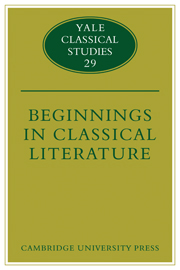Book contents
- Frontmatter
- Contents
- Introduction: beginning at Colonus
- How Greek poems begin
- The Muse corrects: the opening of the Odyssey
- Sappho 16, Gorgias' Helen, and the preface to Herodotus' Histories
- Tragic beginnings: narration, voice, and authority in the prologues of Greek drama
- Plato's first words
- Plautine negotiations: the Poenulus prologue unpacked
- Proems in the middle
- Openings in Horace's Satires and Odes: poet, patron, and audience
- An aristocracy of virtue: Seneca on the beginnings of wisdom
- Beginnings in Plutarch's Lives
- “Initium mihi operis Servius Galba iterum T. Vinius consules …”
Tragic beginnings: narration, voice, and authority in the prologues of Greek drama
Published online by Cambridge University Press: 10 January 2011
- Frontmatter
- Contents
- Introduction: beginning at Colonus
- How Greek poems begin
- The Muse corrects: the opening of the Odyssey
- Sappho 16, Gorgias' Helen, and the preface to Herodotus' Histories
- Tragic beginnings: narration, voice, and authority in the prologues of Greek drama
- Plato's first words
- Plautine negotiations: the Poenulus prologue unpacked
- Proems in the middle
- Openings in Horace's Satires and Odes: poet, patron, and audience
- An aristocracy of virtue: Seneca on the beginnings of wisdom
- Beginnings in Plutarch's Lives
- “Initium mihi operis Servius Galba iterum T. Vinius consules …”
Summary
Narration and authority
For Plato and Aristotle drama is a special form of narration, telling its story through enactment or enacted imitation (mimesis), sometimes in combination with third-person narration (diegesis, apangelia). In both epic and lyric the performing bard or chorus addresses the audience directly; in tragedy the poet is absent from the performance. Without such a mediating explanatory voice, whether in the third person (as in epic) or in the first person (as in lyric), the meaning of the story must emerge from the events themselves as those unfold on the stage. The prologue is the place where tragedy comes closest to having a “narrator” on whom it must depend for its basic orientation. Apart from the prologue, the audience receives no direct, explicit guidance about how to interpret these events, although there may be more or less subtle signposts of another sort (e.g. in choral odes or messengers' speeches).
Epic and lyric poets often begin with authority derived from a divine source of truth and power. But at the beginning of a tragedy proximity to the divine is often a source of danger or mystery rather than of comfort. “To begin from Zeus,” as the rhapsodes do, calls the highest possible authority into one's song; but no tragedy begins with Zeus, except as a remote and mysterious causality (as in Aeschylus' Agamemnon or Prometheus).
- Type
- Chapter
- Information
- Beginnings in Classical Literature , pp. 85 - 112Publisher: Cambridge University PressPrint publication year: 1992
- 7
- Cited by

